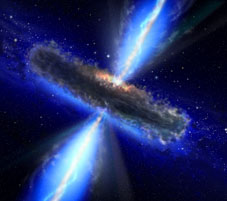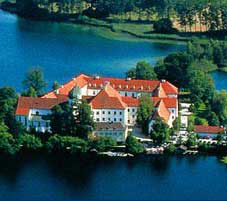Obscured AGN Across Cosmic Time
 |
Obscured AGN Across Cosmic Time Seeon, Bavaria, Germany, 5-8 June 2007 Contact: agnii2007@eso.org |
 |
| News & Announcements | Participants |
Final Programme (with links to presentations in PDF) |
| Important Deadlines | Accommodation |
Local Information |
Scientific Rationale
Current deep surveys, notably in X-rays and the mid-IR, are making it possible to carry out a census of essentially all the luminous AGN in the universe. By penetrating the obscuration that, in Type 2 sources, hides the nuclear regions in the UV to the near-IR spectrum, these new surveys are finding the radio quiet counterparts of the powerful radio galaxies.
The completion of such a census has substantial cosmological significance since it will provide the foundation for identifying the role of AGN feedback in the galaxy formation process. The Type 2 sources are of particular value here since, by acting as their own coronographs, they facilitate the study of the star formation activity and the investigation of the correlated growth of the black hole and the host galaxy.
While radio galaxies - which are being used to trace the massive galaxy population at all epochs - have been studied intensively for the past 40 years, their radio quiet counterparts beyond the local universe are only now being discovered in substantial numbers. The workshop aims to bring together the established radio galaxy community with the students of the radio quiet sources and so help to elucidate the effects of the (possibly) different host galaxies and environment and those of the powerful radio jets.
Scientific Topics
1 Multiwavelength identification of Type 2 AGN
- X-ray selection
- Optical spectroscopy
- Mid-IR selection
- Submillimeter galaxies
- Radio selection
2 Unification Schemes
- Structure and origin of obscuration
- Connection to Type 1 AGN
- Low luminosity obscured AGN
- Detailed studies of local AGN
3 AGN feedback processes
4 Host galaxy properties
- star formation
- masses
- M-sigma relation
5 Ly-alpha blobs and haloes - Extended emission
6 Large scale environments
7 Future instruments
Location
The conference will be held at Kloster Seeon, a recently renovated 10th century benedictine monastery near lake Chiemsee. This state-of-the-art conference center includes a three-star hotel with 88 rooms and a restaurant proposing excellent cuisine with regional specialities. Seeon is located halfway between Munich and Salzburg at the foothills of the southern Bavarian Alps.
Detailed information about the venue can be found at http://www.kloster-seeon.de/seeon_engl/index.html
Participation
The conference will be limited to 120 participants. The conference registration fee is fixed at 100 Euros. Full board at the conference hotel costs 131.50 Euros per day. The total lodging cost for the 3.5 days of the conference is 500 Euros. We foresee no proceedings and no poster session.
Organisers
SOC : Jacqueline Bergeron (IAP), Carlos De Breuck (ESO, co-Chair), Robert Fosbury (ST-ECF), Guinevere Kauffmann (MPA), Julian Krolik (JHU), Ari Laor (Technion), Vincenzo Mainieri (ESO), Patrick Ogle (SSC), Steve Rawlings (Oxford), Daniel Stern (JPL), Wil van Breugel (LLNL and UC Merced), Joel Vernet (ESO, co-Chair), Montserrat Villar-Martin (IAA)
LOC: Carlos De Breuck, Joel Vernet, Robert Fosbury, Vincenzo Mainieri, Britt Sjöberg, Christina Stoffer, Pamela Bristow
